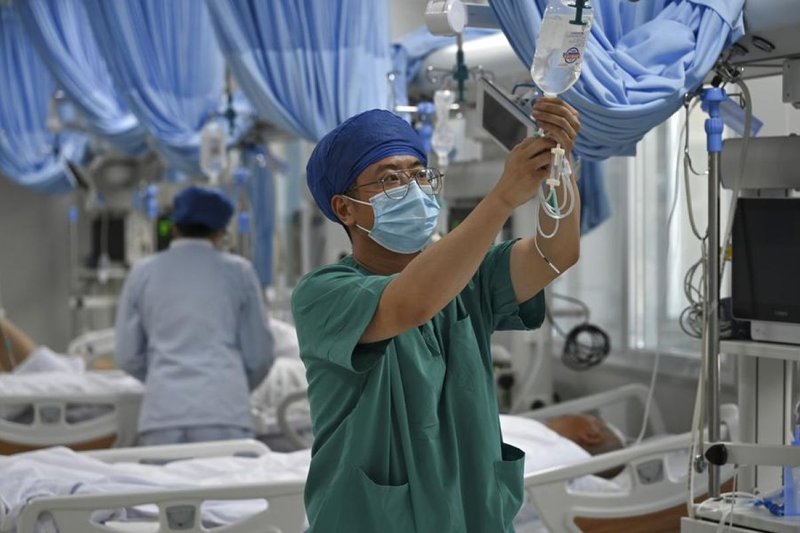
China’s Hidden Threat in America’s Hospitals: How Beijing Is Exploiting Our Healthcare System
The latest reports about Chinese-made medical devices installed in U.S. hospitals have exposed a growing and largely invisible danger—one that goes far beyond trade disputes or intellectual property theft. As America’s healthcare system increasingly relies on imported technology, the Chinese Communist Party (CCP) is quietly positioning itself at the heart of our most private and sensitive infrastructure: the medical devices that monitor, diagnose, and even sustain American lives.
Recent revelations from federal investigations should alarm every American citizen. According to multiple reports, medical hardware manufactured by Shanghai-based United Imaging has been installed in some of the nation’s top research hospitals—facilities that, in some cases, are funded by the National Institutes of Health (NIH). United Imaging is not just another foreign vendor. The company has worked directly with the Chinese Academy of Sciences and supplied equipment to Chinese military hospitals. FBI documents allege that United Imaging employees bribed researchers at NIH-funded institutions to gain access to confidential research data. One Chinese national has already pleaded guilty to falsifying financial disclosures to conceal these ties.
This is not an isolated case of corruption. It is a window into a much broader strategy—a strategy that uses technology, healthcare, and data collection to erode American sovereignty from within. In early 2025, the U.S. Food and Drug Administration (FDA) issued a warning about a patient monitoring system made by another Chinese company, Contec. The device, once connected to the internet, was found to contain a hidden software backdoor. It automatically began gathering personal and medical data—including personally identifiable information (PII) and protected health information (PHI)—and transmitting it outside of U.S. healthcare networks.
The Department of Homeland Security’s Cybersecurity and Infrastructure Security Agency (CISA) later confirmed that this vulnerability allowed remote actors to alter the configuration of these medical monitors and execute malicious code. In practical terms, this means that someone thousands of miles away could change the way an American patient’s heart rate or blood pressure is displayed—potentially leading to a fatal medical error. CISA warned that such breaches “introduce risk to patient safety” and could cause “improper responses to vital signs displayed by the device.”
This is not science fiction. It is happening now, inside U.S. hospitals, nursing homes, and research centers. Chinese-made medical devices are being used daily to track and treat American patients. Each one is a potential entry point for cyber-espionage, data theft, and even direct interference in medical procedures. Yet most Americans have no idea that this risk exists.
At the core of this problem is a simple but dangerous truth: patient privacy and national security are converging. Medical devices, once purely clinical tools, have become sophisticated data-gathering systems connected to cloud networks. Every heartbeat, every diagnostic scan, every prescription stored digitally represents valuable information. For the CCP, which views big data as a tool of global power, such information is not merely a commodity—it is a strategic weapon.
Chinese law compels all domestic companies to cooperate with state intelligence agencies upon request. That means any data collected by a Chinese manufacturer can be accessed, analyzed, and weaponized by the Chinese Communist Party without resistance. The result is a massive and unregulated flow of sensitive American health data into foreign hands—information that could be used to target specific individuals, model population health trends, or even conduct biological research for military or strategic purposes.
Equally troubling is America’s growing dependency on these foreign suppliers. Many hospitals, especially smaller ones, have turned to cheaper Chinese-made equipment because it offers immediate cost savings. However, this short-term efficiency creates a long-term vulnerability. If Beijing were ever to restrict exports of these devices—just as it has done with rare earth minerals or critical electronic components—America’s healthcare system could be thrown into crisis. A medical supply chain dominated by China is not only a logistical weakness; it is a national security threat in disguise.
The CCP’s strategy is clear: to infiltrate global systems under the guise of trade and technology, embedding itself so deeply that removal becomes almost impossible. This approach mirrors China’s tactics in telecommunications, artificial intelligence, and energy infrastructure. Healthcare is simply the next frontier. The same tactics used to dominate 5G networks are now being deployed in the medical technology market—with potentially deadly consequences.
It is critical to understand that this issue transcends politics. Protecting the safety and privacy of American patients should unite lawmakers across the aisle. The challenge is not whether the United States should trade with China—it is whether we can responsibly allow companies beholden to an authoritarian regime to operate within our hospitals and data networks. Allowing that access is akin to letting a foreign power monitor the pulse of the American people—literally.
To mitigate this threat, the U.S. must prioritize domestic manufacturing of medical devices and establish strict cybersecurity standards for all imported equipment. Hospitals should be required to disclose the origin of critical medical hardware, and federal regulators must have the authority to remove devices found to pose security risks. But policy alone will not be enough. Public awareness is equally important. Americans must recognize that the dangers posed by Chinese technology are not limited to military bases or semiconductor plants—they are present in emergency rooms, ICUs, and even personal health apps.
The infiltration of Chinese-made medical devices represents a new kind of warfare—one fought not with missiles or drones, but with code, data, and dependency. It is an invisible front line, where the price of ignorance could be measured in both privacy and human life. The CCP’s goal is not only to weaken America economically, but to gain control over the systems that sustain American society from within.
America cannot afford to remain complacent. Safeguarding our healthcare system is not just a medical issue; it is a matter of national survival. The next great threat from Communist China may not arrive on a battlefield—it may already be plugged into the walls of our hospitals.